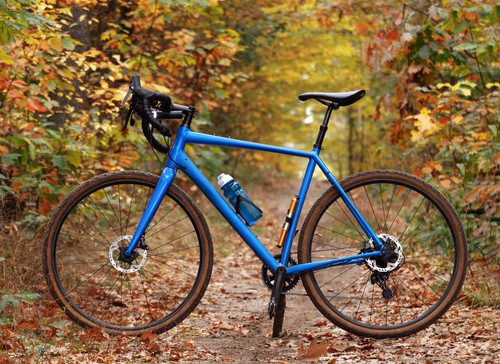When picking up bicycling as a hobby, you will need to do a bit of research when going to buy your bike. Do you want a gravel bike or a road bike, and is it really that important to differentiate between the two? It is important because gravel bikes and their frames are specifically built for off-roading and gravel roads. They use specific materials to make this happen effectively.
Why are gravel bikes so heavy? Gravel bikes are only heavy when they are made with certain materials. Bikes made with steel are going to be your heaviest material, with titanium coming in second, aluminum third, and carbon materials being the lightest of them all. Your bike will be heaviest if both your frame and your fork are made with steel.
Now, when choosing what material to use with your frame, you need to look at the big picture of the pros and cons. While some materials are great for durability, they aren’t so great if you need a lightweight bike or a budget-friendly option.
Weight and Features of Different Frame and Fork Options
Aluminum
When talking about the frame, aluminum is not as light as carbon materials, but it is cheaper to produce. Now, you don’t always want to cheapest frame because a cheap frame can affect your ride(or damping quality) and durability of certain rides. If you are riding mainly on the road or paved area, aluminum should be perfectly fine. However, for gravel roads, you will notice quite a difference and quality with your aluminum frame compared to others.
In reference to forks, aluminum is once again going to be your cheapest option. However, aluminum forks have poor damping qualities and are pretty heavy in comparison to other materials. This material would be a good option if you wanted to improve the handling of a lower budget bike or add cup holders or mudguards.
Steel
Steel is a very tough material to make a frame with, which is good because this means you will have an incredibly durable bike. The issue with steel is there are such varieties depending on alloy combinations and different tubes, that you will experience a different type of ride with every different option.
You can manage a cheaper and more thin tubing to fit into your budget, but your damping quality would suffer more than if you had thicker steel with heavier tubing. The thicker and heavier the tubing, the bigger the price tag that will be attached to the bike.
When looking at steel forks, they will be twice as heavy as a carbon option but come with some interesting features that make them desirable.
This is dependent on the tube set and construction of the steel forks, but usually, the damping qualities are phenomenal while maintaining excellent stiffness. Steel forks will also protect the frame in a front end crash and can always be bent back to its original form if bent or damaged.
Titanium
Titanium frames are going to be your most expensive material to make a frame with. The sleek look combined with a large number of positives it has makes this the most popular material. Titanium is lighter than steel but just as tough.
The damping qualities are even better than steel, and it is totally resistant to corrosion. While there are a few titanium frames on the market, most of the time, you need to visit a custom frame builder to get this material.
Titanium forks are going to rate at your highest level of comfort, given that their damping qualities are the highest, and they have a lower weight than steel. While titanium is your most expensive material, you also will get the most durable and long-lasting fork that money can buy. You would very rarely have to replace your fork if it was made from titanium.
Carbon
Carbon is the most custom-friendly material you can find when getting a bike frame. Due to the nature of production when dealing with carbon, each individual piece of the frame can be adjusted and given a different level of flexibility.
Due to the extreme stiffness to weight ratio that carbon fiber polymers have, less weight material is actually needed, making this your lightest option.
Unfortunately, even with all the custom options you get with carbon, you would need an expert frame maker to compete with the damping qualities you would get with a high-end steel or titanium frame.
Carbon frames are also more susceptible to impacts, and the damage isn’t always visible on carbon frames. Just because a frame is custom made – carbon or not – doesn’t make it high quality.
Carbon forks are usually looked at for their interesting geometrical looks and countless features. These are the most popular, given the abilities you have to really make these reflect whatever you want. They are only marginally lighter than aluminum forks but have a wider variety of abilities.
Road bikes vs. Gravel Bikes
The differences between road and gravel bikes are simply to allow for different terrain abilities. Your gravel bikes have certain parts and additions that allow for safer and smoother rides when going off-road or using a gravel road.
Geometry
The geometry of a gravel bike is much more relaxed than a road bike. Certain measurements made allow for smoother steering on a gravel bike, which usually is twitchier on a road bike.
Generally, when riding on a rough terrain, riding in a more upright position is more comfortable, so a gravel bike is built to sit you more upright rather than a downward slope that sits you lower on a road bike.
Disc Brakes
Found on all gravel bikes, disc brakes allow for better handling and more confidence when riding on rougher terrain. When riding downhill, in the rain, or trying to stop in a muddy area, you will have more confidence in the efficiency of your braking ability.
Having the confidence that you will be able to stop in a timely manner gives you the ability to handle riskier terrain or roads you might’ve stayed away from otherwise.
Bigger Tires
With the different custom options you have on a gravel bike, you can also allow for bigger tires than what will normally come on your bike. Bigger tires allow for better handling and grip on any terrain, but also more stability when landing jumps or riding over big rocky areas.
Having bigger tires also allows you to feel less of the smaller rocks and pebbles on the roads since your tires can absorb more.
Frames and Forks
The frame and fork material and build are incredibly important when looking at a gravel bike. Road bikes can be built pretty standardly and do not have to have a huge durability resistance or damage resistance.
When building or buying a gravel bike, materials they are built with can make the difference between a long-lasting, enjoyable bike and a bike that only lasts one ride.
Conclusion
Overall, if you are looking for a bike you can just use on a sidewalk or road, a road bike is your easiest and best option. If you bike on rougher terrain, you will need a gravel bike to be able to withstand everything your bike will come into contact with.
Every jump, landing, fall or bump that you will inevitably encounter will need to be absorbed (or at least handled) by your tires, frame, and fork. You want the smoothest ride possible, and road bikes just don’t have the durability they need to handle rough terrain.
Related articles:
Choosing the Best Gravel Bike for Women Under $2000
Are Gravel Bikes Good for Touring?

